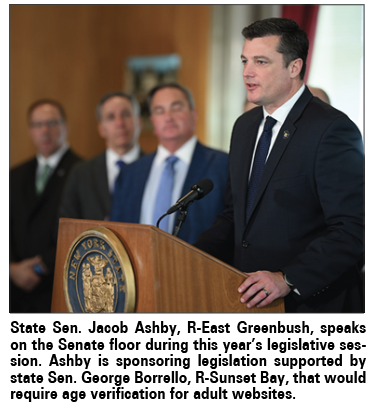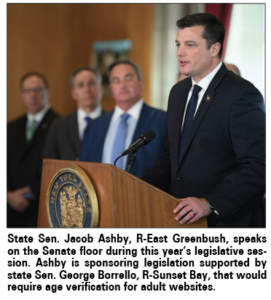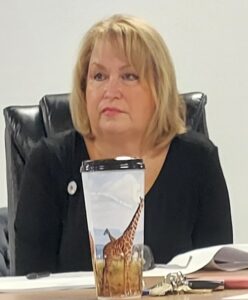Borrello Co-Sponsors Adult Website Age Verification Bill

State Sen. Jacob Ashby, R-East Greenbush, speaks on the Senate floor during this year’s legislative session. Ashby is sponsoring legislation supported by state Sen. George Borrello, R-Sunset Bay, that would require age verification for adult websites.
State Sen. George Borrello is one of 15 state Senators to sign on as a co-sponsor of legislation to require age verification for adult websites.
One of those co-sponsors is Democrat Luis Sepulveda of the Bronx, while the rest are Republicans. Sen. Jacob Ashby, R-East Greenbush, introduced S.3591 back in January. The legislation would require adult websites to verify that all users of their content are 18 years of age or older, with those that don’t comply facing fines of up to $50,000 a day.
“The internet is a dangerous place for children, rife with sexual material that is harmful to minors,” Ashby wrote in his legislative justification. “The ease of access to this material is downright scary. This legislation seeks to prioritize the protection of children by requiring pornography websites to verify the age of its users. Upon verification that a user is 18 years of age or older, access to the site would be given.”
The Supreme Court in June upheld a Texas law aimed at blocking children under 18 from seeing online pornography by requiring websites to verify the ages of all visitors. According to the Free Speech Center at Middle Tennessee State University 21 states have passed similar age verification laws in an attempt to restrict access to adult material from minors, but digital rights groups have raised questions about such laws’ effects on free speech and whether verifying ages by accessing sensitive data could violate people’s privacy.
The Texas law requires websites hosting pornographic material to verify the ages of users in hopes of stopping those under 18 from visiting. Adults would need to supply websites with a government-issued ID or use third-party age-verification services. The law carries fines of up to $10,000 per violation — fined against the website — that could be raised to up to $250,000 per violation by a minor. Texas officials argued that technology has improved significantly in the last 20 years, allowing online platforms to easily check users’ ages with a quick picture. Those requirements are more like ID checks at brick-and-mortar adult stores that were upheld by the Supreme Court in the 1960s, the state said.
Internet service providers, search engines and news sites are exempt from the Texas law. Ashby’s proposal in New York also exempts news sites, ISPs and search engines.
Samir Jain, vice president of policy at the nonprofit Center for Democracy & Technology, said the court’s decision on age verification “does far more than uphold an incidental burden on adults’ speech. It overturns decades of precedent and has the potential to upend access to First Amendment-protected speech on the internet for everyone, children and adults alike.”
“Age verification requirements still raise serious privacy and free expression concerns,” Jain said to the Associated Press after the Supreme Court’s decision. “If states are to go forward with these burdensome laws, age verification tools must be accurate and limit collection, sharing, and retention of personal information, particularly sensitive information like birthdate and biometric data.”




